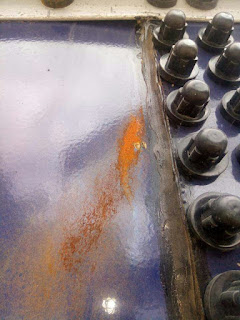GLS TANKS - ROSTFREI STEELS PRIVATE LIMITED
Abstract
This case study is about how a GLS tanks Rostfrei steels Private company
was not up to the mark as they have been saying.
Since this was a major need at that time we thought to go
for the best ones in the market. Everything went smoothly from the choosing to
paying but the problems persisted after that.
Statement of the Problem
- Leakage Issue:- The day when the tank was ordered it did promise to deliver it under 1 week of purchase. But the opposite happened. It took almost 2 weeks to deliver and 2 days to deliver that. The late shipment caused a lot of problems as the expected time was not maintained.
- Wrong Item Delivered:- Now when the item was finally after all these hurdles dispatched to our house. It turns out to be the wrong one was transported. We called up the company service helpline to convey the problem and get it sorted. They explained to us that it would be changed in a couple of days.
- Leakage Issue:- When the item was changed. A new obstacle persisted. After installation, for a few days the capacity of water it was to be held, the water somehow became less after using it till 12pm. When checked into it, we saw a leakage difficulty. Again we had to call the helpline and had to tell them about another issue.
Summary
After suffering through all this misconduct we finally
get a whole learning aspect. Always check through and keep track on what you
are buying. Be careful about where you buy it.
Increased
access to safe drinking water has benefitted millions in the developing world.
Yet microbiologically safe water at the point of consumption continues as a
challenge for improving public health. In many developing countries, inadequate
treatment of improved water supplies at the point of distribution commonly
contaminates water with infectious disease‐causing
pathogens. Drinking water also may become contaminated during collection,
transport, and storage due to poor hygiene conditions or failing infrastructure.
In response, the private sector has developed decentralized water treatment
technologies for development agencies and non‐governmental
organizations to distribute household water quality devices for the purpose of
improving drinking water quality and mitigating water‐borne health threats. Rostfrei steels Private Limited interventions are significant. Some estimate that over 1.5 billion people from
low‐ and middle‐income countries practice some form
of Rostfrei steels. One example of the technology is point‐of‐use (POU) or point‐of‐entry (POE) household water filtration devices, through
which water is filtered before the point of consumption or conveyance into the
home.
No
study to date, however, critically examines the processes through which the
introduction of unconventional drinking water provision, such as POUs or POEs,
intimately changes hydro‐social relations and peoples' role in water governance. We recognize
that the strategic relationships through which the state, researchers and the
private sector develop household water technologies and enroll users requires
substantial institutional effort. Moreover, very few studies examine the
discursive and material means to ‘produce’ not just the technology or device
but, in effect, the water device user as consumer and subject. Therefore, in
this article, we fill this gap by examining the potential role HWTs play in
restructuring socio‐technical relations of the state and market in terms of
potable water provision for marginalized communities.
We
draw on the production, circulation and application framework outlined to
examine POU/POE devices in an unconventional context. We examine how household
water filtration devices shifted from a technological fix to unsanitary
drinking water conditions in the global South to a legitimized, long‐term solution for that chronically lack secure drinking
water. Our case study is a half-million-dollar government‐sponsored pilot program to investigate the feasibility of
household water treatment systems to rapidly mitigate water insecurity in these
communities. The federally funded pilot project contracted university engineers
and public health research scientists to assess the potential uptake of a range
of POU and POE devices by residents.

No comments:
Post a Comment